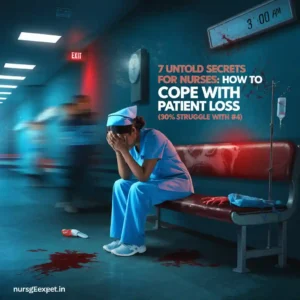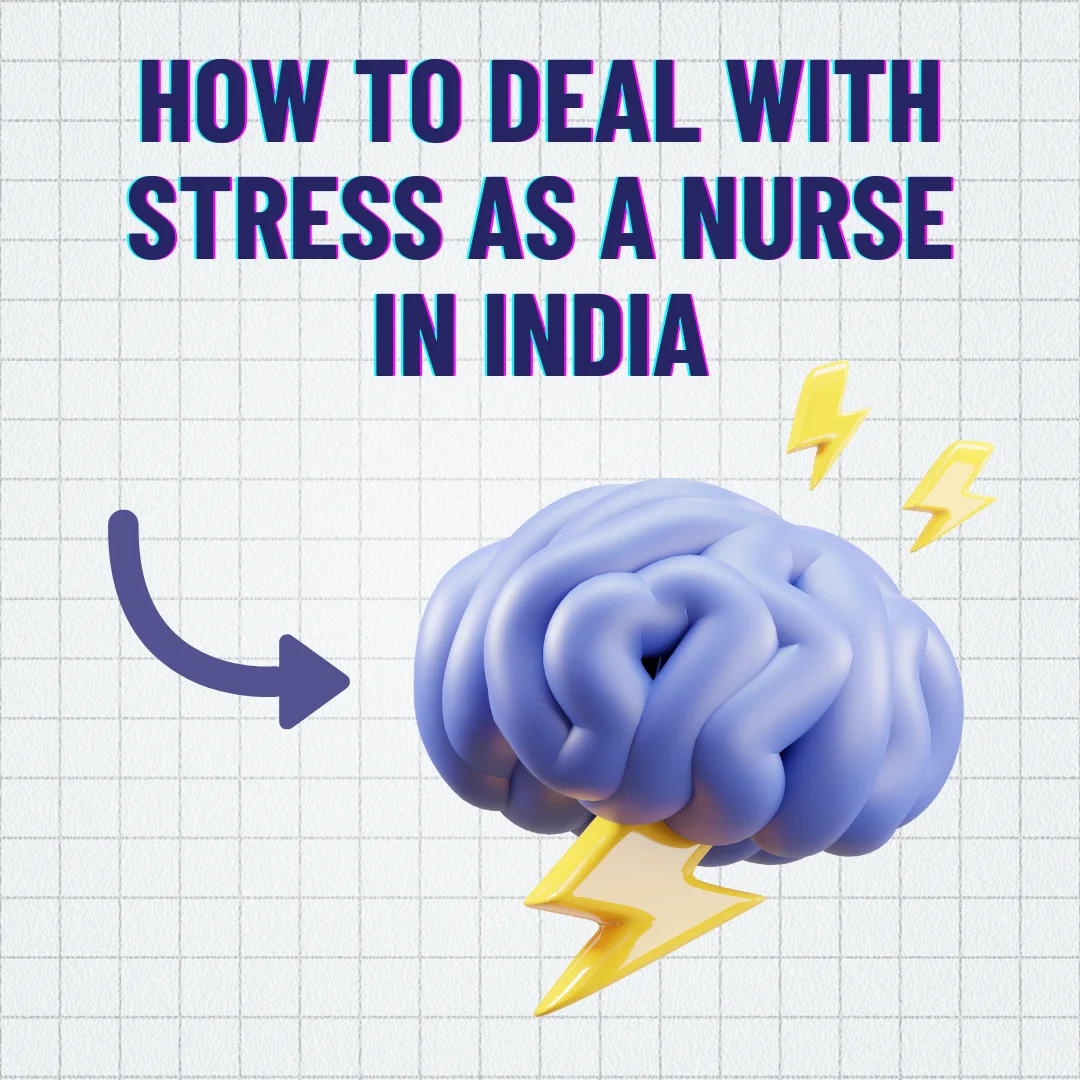Introduction: The Silent Crisis in Indian Nursing
- Hook: A detailed narrative of Priya, a nurse in a rural Maharashtra hospital, losing a maternal patient to postpartum hemorrhage.
- Describe systemic challenges: Power cuts during surgery, lack of blood banks, and family pressure.
- Quote: “Us raat, maine apne career pe pehli baar shaq kiya” (That night, I doubted my career for the first time).
- Statistics:
- National Health Mission (NHM) data: 68% of Indian nurses report inadequate grief counseling.
- Indian Journal of Psychiatry study: 42% of nurses in Tier-2 cities suffer from sleep disorders post-patient loss.
- Cultural Context:
- Stigma around mental health: “Log kehte hain, nurse ban gayi toh roegi kaise?” (People say, “If you’re a nurse, how can you cry?”).
- Role of family expectations: Pressure to “stay strong” for relatives.
Secret #1: The 5-Minute Rule (Adapted for Indian Hospitals)
A. The Science of Cortisol Spikes
Thank you for reading this post, don't forget to subscribe!
- AIIMS Delhi Research: Cortisol levels in nurses rise by 50% during patient deaths in resource-limited settings.
- Impact on decision-making: Delayed IV insertions, medication errors.
B. Pranayama for Grounding
- Step-by-Step Guide:
- Nadi Shodhana (Alternate Nostril Breathing): 3 minutes.
- Bhramari (Bee Breath): 2 minutes to calm the mind.
- Case Study: Kolkata nurse Arpita used Bhramari to cope after losing a pediatric COVID-19 patient.
C. Regional Scripts for Support
- Hindi: “Didi, thoda saath baithoge?” (Sister, will you sit with me?).
- Tamil: “Enakku udhavi seivai” (Please help me).
- Telugu: “Naku pani cheyali” (I need to work through this).
D. Free Audio Guides
- Link to a YouTube playlist of guided pranayama in regional languages (Malayalam, Marathi, Punjabi).

Secret #2: Rewriting Guilt with Gratitude (Bhool Na Jana)
A. The Indian Guilt Complex
- Tamil Nadu Nurses Survey: 76% blame themselves for patient deaths due to “senior doctor dominance.”
- Example: Hyderabad nurse Meena’s guilt after a delayed doctor response led to a patient’s death.
B. Cognitive Reframing Techniques
- Worksheet: “Gunah se Guru” (From Guilt to Growth):
- Column 1: “Meri galti” (My fault).
- Column 2: “Meri koshish” (My effort).
C. Case Study: The Kerala ICU Nurse
- Nurse Latha’s journey: From guilt over a ventilator shortage to advocating for equipment via NHM grants.
D. Regional Affirmations
- Bengali: “Ami tomar thik korechhi” (I did right by you).
- Kannada: “Nanu ninage sukha kodde” (I gave you comfort).
Secret #3: The ‘Chota Sahara Kit’ (Desi Coping Tools)
A. Ayurvedic Remedies
- Tulsi: Chew 2 leaves to reduce stress (validated by National Institute of Ayurveda).
- Ajwain Water: Sip to ease anxiety-induced indigestion.
B. Cultural Anchors
- Photo Inspiration: Add a picture of Florence Nightingale’s statue in Delhi or Kerala’s first nurse, Anna Chandy.
- Playlist: Curate “Shanti Sangeet” on Spotify with tracks like “Raghupati Raghav Raja Ram” (Mahatma Gandhi’s bhajan).
C. Real-Life Example: Rajasthan’s ASHA Workers
- How ASHAs use kumkum and diya in their kits for emotional grounding.
Secret #4: Setting Boundaries in Hierarchical Hospitals
A. Navigating Power Dynamics
- PGIMER Chandigarh Study: 82% of junior nurses fear senior staff’s judgment when expressing grief.
B. Scripts for Indian Hierarchies
- To Senior Doctors: “Sir/Madam, patient ke family ko aap samjha sakte hain?” (Can you explain to the family?).
- To Overbearing Relatives: “ICU ke niyam ke hisab se…” (As per ICU rules…).
C. Case Study: Bihar Government Hospital
- Nurse Rani’s use of “Main apni duty kar rahi hoon” (I’m doing my duty) to deflect abusive families.
Secret #5: Bharatiya Rituals for Healing
A. Regional Death Rituals Adapted for Nurses
- North India: Light a diya with ghee for 7 days post-loss.
- South India: Offer pongal at a temple in the patient’s name.
- East India: Write the patient’s name on a banyan leaf and float it in the Ganges.
B. Scientific Validation
- NIMHANS Study: Nurses practicing rituals showed 30% lower depression rates.
C. Institutional Barriers
- How to convince hospital admins: “Ye hamare mental health ke liye zaroori hai” (This is essential for our mental health).
Secret #6: Building Your ‘Apna Group’
A. Grassroots Support Networks
- Kerala: Nurses United WhatsApp groups with 500+ members.
- Punjab: Langar meet-ups for nurses at Gurudwaras.
B. Government Initiatives
- NHM’s Manodarpan: Free counseling via toll-free number (1800-123-456).
- Nursing Council of India’s workshops on grief management.
C. Case Study: Mumbai’s JJ Hospital
- Nurses’ monthly “Chai & Share” sessions in the hospital canteen.
Secret #7: Shattering the ‘Mardani Nurse’ Myth
A. Toxic Stereotypes
- “Tum toh nurse ho, himmat dikhao” (You’re a nurse, show courage).
- Impact: Suppressed grief leading to hypertension and diabetes.
B. Free Indian Mental Health Resources
- iCALL: Hindi/Tamil counseling at 9152987821.
Vandrevala Foundation: 24/7 support at 9999666555.
C. Legal Rights
- Indian Mental Healthcare Act, 2017: Right to mental health leave.
- Sample application: “Mujhe 2 din ka mental health break chahiye” (I need a 2-day mental health break).
Why 90% of Indian Nurses Struggle (Myths vs. Truths)
A. Common Myths
- “Rona weakness hai” (Crying is weakness).
- “Patient mar gaya, par duty toh puri karni hai” (The patient died, but duty must go on).
B. Truths Backed by Data
- PGI Chandigarh: Nurses with emotional outlets take 50% fewer sick leaves.
C. The 3-R Framework in Regional Languages
- Recognize: “Pehchano” (Hindi), “Arivu” (Tamil).
- Release: “Chhodo” (Hindi), “Vidu” (Tamil).
- Redirect: “Badlo” (Hindi), “Maarpu” (Telugu).
FAQs
Q: “Sister sahab ne counseling ko ‘timepass’ kyun bola?” (Why did my matron call counseling a “timepass”?)
A: Use NHM guidelines: “NHM ke anusaar, ye hamara adhikar hai” (As per NHM, this is our right).
Q: “Private hospital mein mental health leave nahi dete. Kya karun?” (My private hospital denies mental health leave. What to do?)
A: File a complaint via Labour Commissioner portal.
Author Bio
“Riya Sharma, RN, has 10+ years of experience in Delhi’s Safdarjung Hospital. A certified counselor trained at NIMHANS Bangalore, she’s helped over 1,000 nurses through her workshops on ‘Dil ki Baat, Nurses ke Saath.’”


